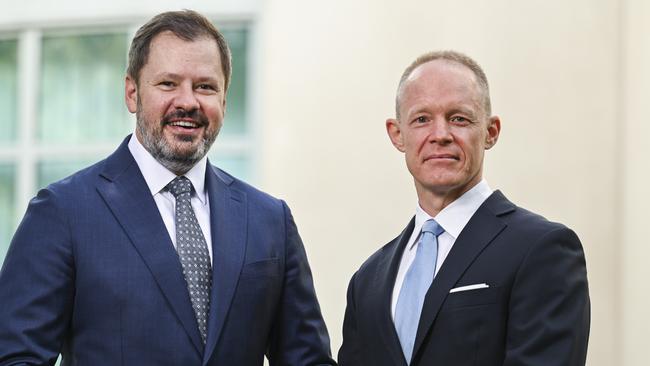$15bn NRF woos super funds and venture capitalists
The $15bn NRF will woo super funds and venture capitalists to tap into ‘one of the biggest savings pools on the planet’, as Ed Husic moves to release co-investment plans in coming weeks.

The $15bn National Reconstruction Fund will woo super funds and venture capitalists to tap into “one of the biggest savings pools on the planet”, as Ed Husic revealed new detailed co-investment plans across the NRF’s seven priority areas will be released within weeks.
The Industry Minister and newly appointed NRF chief executive Ivan Power on Wednesday signalled the off-budget fund would seek to “team up” with private equity to bankroll investments and re-energise Australia’s manufacturing competitiveness.
Mr Husic and Mr Power – a former Macquarie Group executive director – said Australia must not have “all our eggs in one China basket” and better align policies as Joe Biden’s Inflation Reduction Act helps the US dominate global clean energy investment.
While the NRF focuses on rebuilding Australia’s manufacturing base and combating “concentrated, broken supply chains”, The Australian understands Energy Minister Chris Bowen and Jim Chalmers are working on policies ahead of the May 14 budget to deliver IRA-like incentives.
With the government leaning on super funds to support its marquee manufacturing and housing funds, Mr Power said “we have on a per capita basis one of the deepest pools of capital in the world and very sophisticated investors”.
Flagging the imminent release of NRF co-investment plans aiding decision-making of the fund and government policies, Mr Husic said “we’ve got one of the biggest savings pools on the planet through superannuation, so where we can team up with them is really important”.
“Co-investment is a big part of the NRF’s focus. There’ll be others in venture capital and private equity that want to be able to team up with us on individual investments. We want to get the biggest bang for the buck.”
Ramping up the government’s regional manufacturing focus, Mr Bowen and Mr Husic on Wednesday announced $200m in grants for Australian steelmakers under the first round of Powering the Regions funding.
The Australian Workers Union said funding for BlueScope and Liberty to upgrade and build blast furnaces in NSW and South Australia was a “crucial early step to realise Australia’s potential as a global green steel powerhouse”.
After the NRF investment mandate was announced on November 30, eight months after legislation passed through parliament, more than 160 companies have expressed interest in accessing finance via debt, equity and guarantee options.
The NRF does not offer grants and expects applicants to demonstrate investment returns and ability to repay debt.
Mr Power said the NRF would focus on finalising commitments as “soon as we can in 2024” and ensuring “we’ve got proper processes in place in terms of how we’re assessing risk, pricing risk and how we’re managing risk”.
“To achieve our mandate, we do have to take risk. It is going to be really important that we’re building up those processes. It’s going to be a delicate tension.
“Capital is extremely fluid in terms of where it goes and where it responds to. Ultimately, people don’t invest in spreadsheets. They invest in things that they hear about, and they know about and the stories around that.
“I’m a massive believer in the power of private enterprise and private capital to change Australia. It is so important that we are working with that private capital and with that private enterprise to be driving the change that we want to drive.”
As some companies move offshore or consider shifting bases, Mr Husic said countries were “leaning into manufacturing in a big way … We’ve got to rebuild capability. There is a sovereign interest in that. We cannot have all our eggs in one China basket, having all that work done there. We recognise what that does to supply chains. That’s why as much as this is important economically, this is important from a national interest perspective,” he said.
Mr Power, who quit Macquarie Group in 2019, has advised Treasury, the Department of Social Services, Housing Australia and early-stage Australian companies as a direct investor and consultant. “We think about Australia like a big island, which it is, but in the global sense of things, this is a competitive environment. The NRF is no panacea for any of these but it is a very important component and link in the chain.”
The seven NRF priority areas include renewables and low-emissions technologies, defence, medical science and value-adds in agriculture, forestry, fisheries, transport and resources.




To join the conversation, please log in. Don't have an account? Register
Join the conversation, you are commenting as Logout